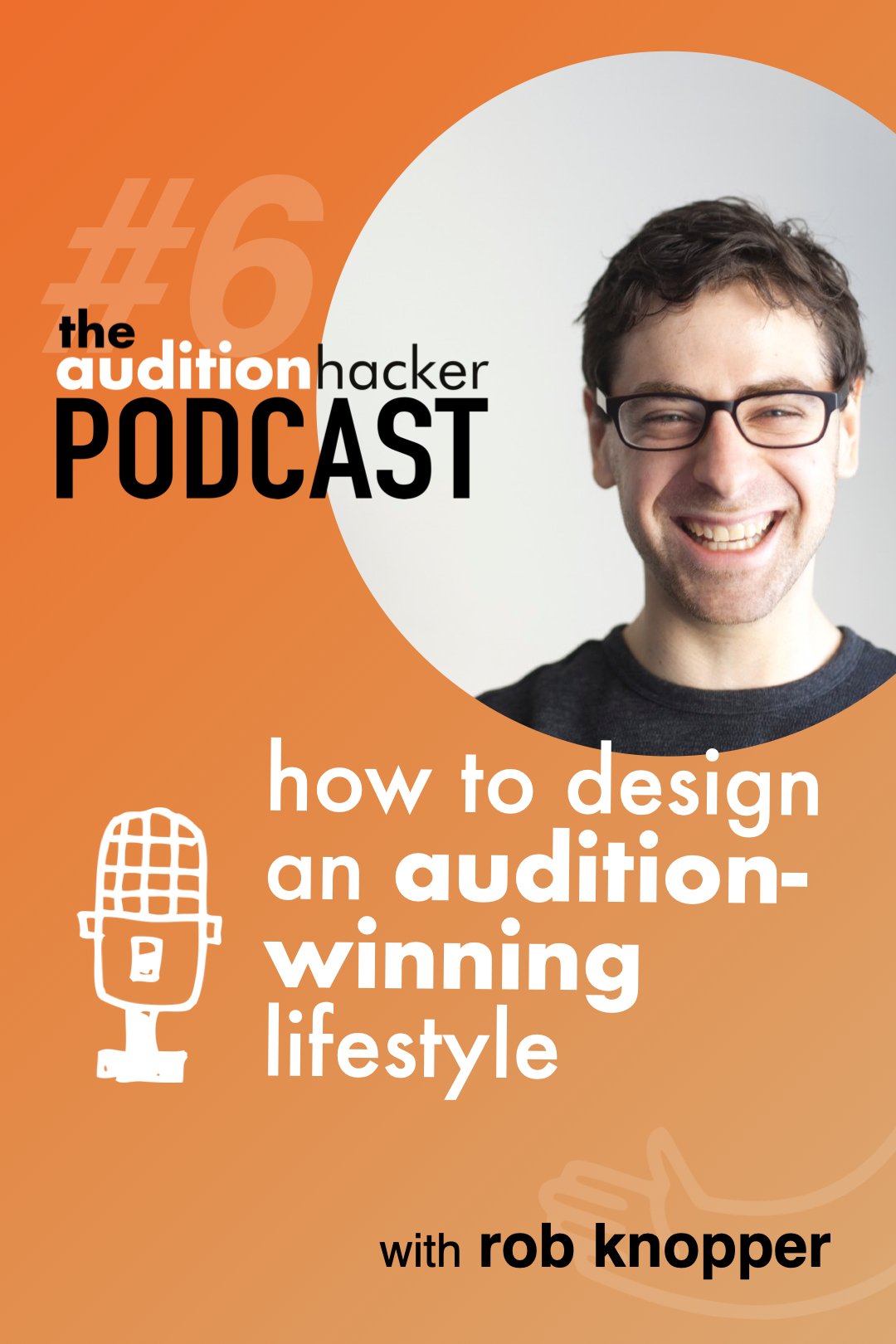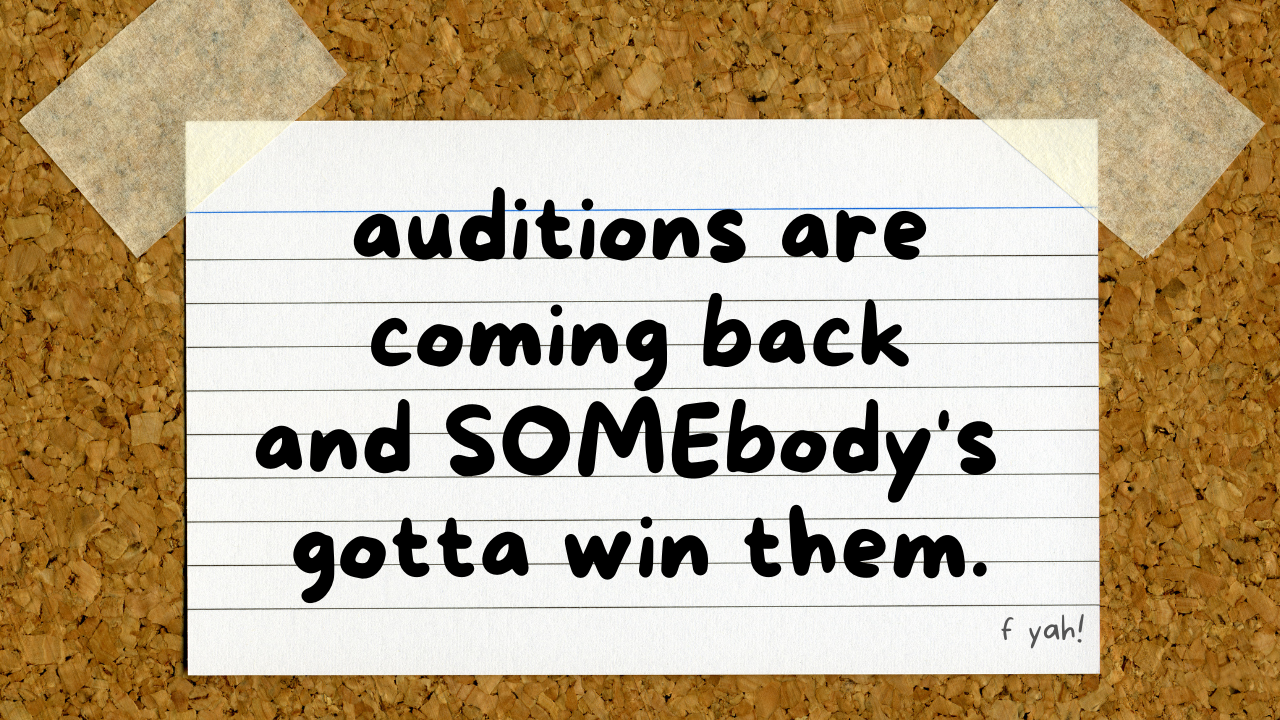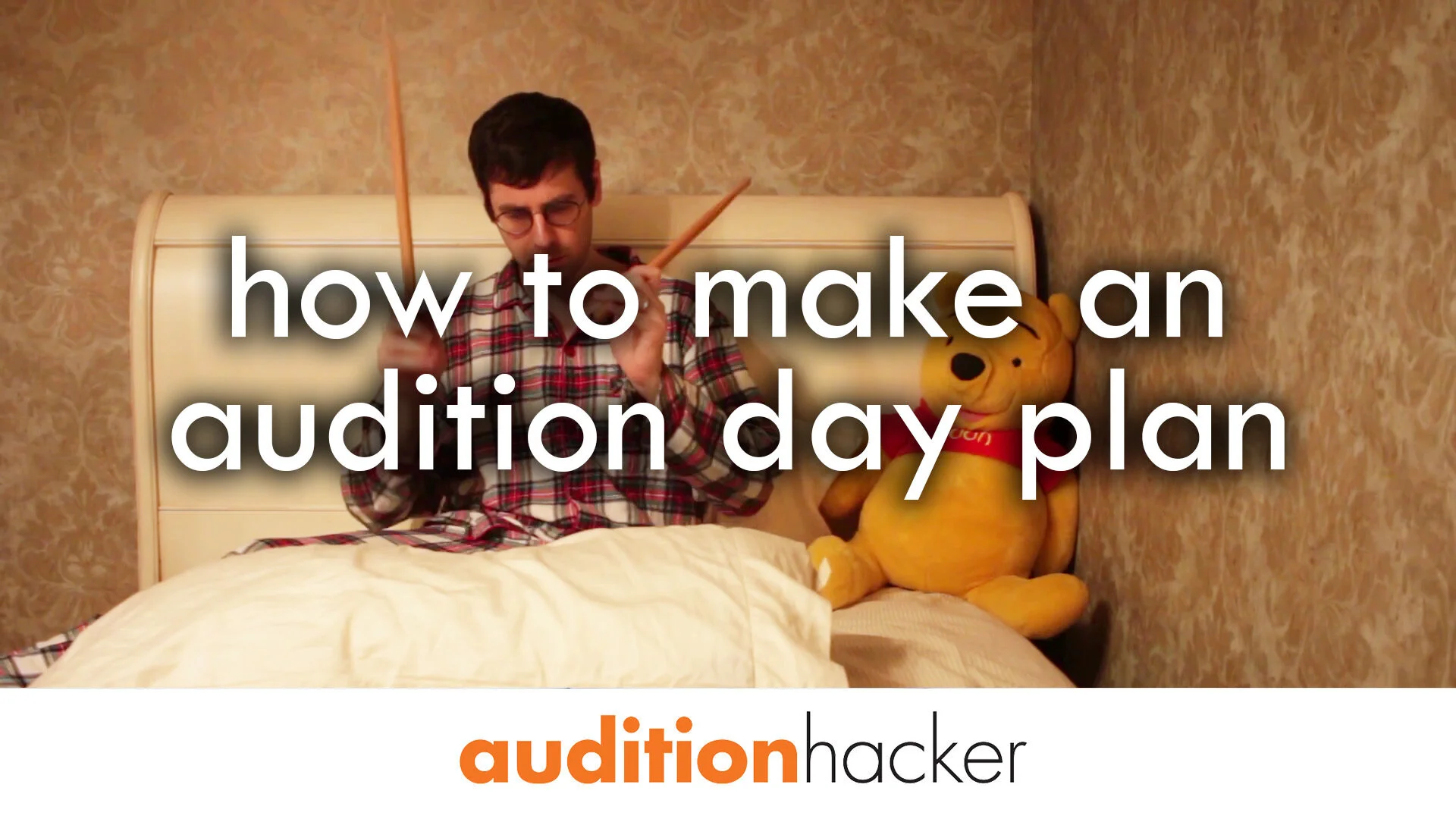some audition comments are confusing. some are useless. and sometimes a comment is downright devastating.
about a month before my met opera audition, a coach came down to work with me and the other fellows at the new world symphony. i had already been practicing for more than three months, and my excerpts were at a decent level. there were still problems and i had a long list of issues, but i felt on track to be ready.
and then the big comment came. “rob, your cymbal crashes aren’t blossoming.” and in an instant, i became a beginner percussionist all over again.
my cymbal playing spiraled downwards. i started questioning my basic technique on the instrument. i basically “forgot” how to play. my cymbal crashes didn’t open up or blossom… they cramped up and the tone was ruined. my playing sounded tense and tight and i wondered if i had just lost the ability to play cymbals. more about why this happened later, but for now just know that...
...one single comment can derail you.
it can be really easy to hear a comment from a professional musician you respect and take it as gospel. you might assume that since this person is in a major orchestra, they represent the entire classical music industry and this must be your biggest problem as a musician.
and if you don’t know how to fix the issue, or if you disagree with the comment, it can send you to a dark place musically and emotionally.
but that’s the w r o n g r e s p o n s e. your playing is a complicated, giant ocean of information and experiences. and one comment from some random person is just one comment. it's just one small piece of feedback in the bigger story of your long-term musical improvement. you’ve been developing it diligently since you were a kid, one step at a time. you’ve been evolving and developing your playing in front of teachers, week after week, for years, and you CAN'T let one comment affect you like this.
yes, you should generally point yourself in the right direction and make sure you’re improving in a way that’s leading you towards your goals. and yes, trying to sound acceptable to established professionals is a great goal! but that one comment is just a data point. it doesn’t represent every professional musician alive, and it might not even be the same comment you’d get from another professional about the same performance.
what do scientists do with data? they carefully analyze it with lots of other data. they collect as much data as they can and they specifically don’t let one individual data point, no matter how intriguing, lead them to rash decision. they find trends and draw conclusions based on extensive research.
analyzing audition comments like a scientist is exactly what you should do. so today i want to help you figure out how to deal with audition comments. i’ll go over a 4 step process that will help you collect comments and apply the information you learned in the most healthy, productive way possible.
first things first. if audition comments can be so hurtful, why look at them at all?
why are audition comments helpful?
because they’re the first impression of a professional musician. they’re a direct reaction to your audition performance, which is the one thing that stands in between you and your future career.
they’re different from getting comments from a teacher. a teacher knows you… you have a relationship. your teacher has heard your strengths and weaknesses over and over in previous lessons. they’re giving you comments in context of all the other things you’ve already talked about.
but a new person hearing you for the first time is giving you an honest first impression of how you sound compared to all the other people they listened to in the audition. they’re giving you a hint about how you compare to the level you need to be in order to win an audition.
so yes, audition comments are a helpful and necessary part of audition preparation.
EVEN THOUGH THIS IS TRUE, some audition comments are unhelpful. audition jurors are busy. they’re tired and bored. they just listened to 30 other people play the same excerpts, and they’re too lazy to write the same thing over and over. they usually write in shorthand that only they can understand.
so some comments are worthwhile, and some aren’t. that's just how it is. got it? good, let’s jump into the process.
want to nail your next audition?
here’s the five part audition preparation method that i used to win a job at the MET orchestra.
the best part? it works for every instrument.
step 1: gather data
when you’re done with an audition, you need two important pieces of information:
the audition recording.
you absolutely MUST RECORD your audition. it’s an essential part of understanding where you are, what level you’re at, and where you need to go next. if you record your audition, there’s no saying, “i have no idea why i got cut.” you can listen back and try to figure out why you did get cut.
if you’re worried the orchestra will take your phone during the audition, then get one of these super secret james bond spy recorder pens, USB keys, or necklaces.
2. juror comments.
email the personnel manager and ask for comments from jury members. email or call members of the section (if you know them) and ask for comments. make sure to write everything down clearly so you can analyze them later.
step 2: internal analysis
as a musician, you have a certain understanding of “how things should sound.” but as an up-and-coming musician, you should be going to concerts, listening to recordings, and recording yourself a lot to improve and develop your sense of musicality. your current standards probably aren’t at the same level as top orchestra musicians, and you need to figure how to improve your standards.
so the first thing you should do with your data is to try to understand the difference between how you think you should sound and how these professional musicians think you should sound. you need to understand their first impressions. here’s how.
listen to the recording
as you listen, pretend you’re an audition juror. make comments for each excerpt about what you think needs improvement. how does your playing compare to how you think these excerpts should sound?
2. read the juror comments
go down the list of comments, one at a time, and try to understand each one. is it a comment that you expected? is it about something you didn’t know was wrong? if it’s new, try to understand exactly what that juror meant. listen back to your recording as many times as you need to.
if you have more than one set of comments, compare them to each other. compare the comments to your mock audition comments if you have them. listen to professional recordings and really try to understand, in detail, what the difference between you and a currently employed professional musician might be.
now, there can be a really big difference from one audition juror to the next. each member of the audition committee is thinking about different things at the same time. everyone has different musical priorities and thoughts spinning around their brain as they listen to auditions. you can read my other article, the mind of an audition juror, to learn more about that.
once you’ve gone over all the data, the goal is to identify trends.
the more times you hear a comment about a certain issue, the more likely it’s a major issue in your playing. that’s a trend. for instance, do multiple people tell you you’re shortening rests? good! now you know, and now you can fix it.
step 3: external analysis
once you’ve figured out the trends in your comments, you have a pretty good idea of what to work on. but now the question is… how?
THIS is a great time to email a teacher that you can trust to get help analyzing the results of this audition.
so, choose your “trending” comments, and send an email to your teacher that looks this like:
and you should attach two things to the email:
a cut-out, prepared audio track from your audition recording that includes an example of the issue happening, and
a prepared PDF with the sheet music and brackets around the excerpt
if you send an email like this that’s super easy for your teacher to respond to, it’s more likely that they will respond quickly with thoughtful ideas.
you should also talk out your trending comments with your friends. what do your classmates think you should do? some of the best ideas i’ve gotten have been while discussing issues after auditions with close friends. it’s helpful to hear their feedback, but oftentimes you can answer your own questions by simply speaking out your thoughts to a friend.
step 4: plan your next steps
once you’ve found some ideas for improvement, it’s time to schedule them into your life so they actually happen.
the goal with this step is to come up with a short list of between 1-3 action items for how you’re going to tackle this issue.
it might look like this:
“during my next audition, i’ll practice excerpts with the metronome on every other downbeat after i learn the notes.”
or,
“i’ll spend the next 3 days finding more effective long-tone warmups.”
you should carefully think about how you prepared for this last audition, and identify exactly when during the process you could work on your issue.
maybe your issue was a fluke, and you think it won’t happen again. well, why didn’t you find this fluke earlier? why did your process allow this fluke error to get by without being noticed? if you do enough mock auditions you’ll give yourself a better chance to uncover every last fluke and work on them in advance.
what are your action items?
now i’ll point this back at you. i’d like to offer for you to use me as a sounding board. if you go through the above process and you want to send me the email from step 3, go ahead. my email is hello@robknopper.com. you should also include your 1-3 action items so i can see what you’re planning. i’ll do my best to listen in the next few days and shoot you an idea or two about how to deal with the problem.
also, for the next week or two i’m going to do a few articles on this topic of advanced audition strategies. and next week i’m announcing the january-april session of my personal audition coaching program, rob’s inner circle, so keep an eye out for that.
thanks for reading!
want to nail your next audition?
here’s the five part audition preparation method that i used to win a job at the MET orchestra.
the best part? it works for every instrument.

















in 2019, a cellist named maria reached out to me about her audition struggles. on paper, she was the “worst audition candidate ever” (her words). she had 2 small children, a full-time teaching job, and hadn’t taken an audition in 4 years.